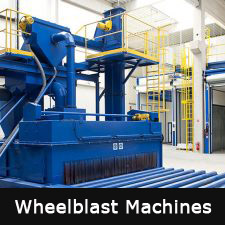
Functional coatings may be applied to change the surface properties of the metal, such as adhesion, water-proofing, corrosion resistance or wear resistance.
Abrasive blasting forcibly propels a stream of material against a surface under high pressure to smoothen or roughen surfaces, shape a surface or remove surface contaminants. Cleaning is the first stage treatment before the application of any coating. Surface contaminants on the steel surface, such as oil and grease must be removed before the process.
Wheel blasting directly converts electric motor energy into kinetic abrasive energy by rotating a turbine wheel. The capacity of each wheel goes from approximately 60kg/min up to 1200kg/min. With these large amounts of accelerated abrasive, wheelblast machines are used where big parts or large areas of parts have to be derusted, descaled, deburred, desanded or cleaned.
Air blast machines can take the form of a blastroom or blast cabinet. The blast media is pneumatically accelerated by compressed air and projected by nozzles onto the component. The blasting task determines the choice of the abrasive media, in most cases any type of dry or free running abrasive media can be used.
Internal cement lining assures anti-corrosion protection and stability of hydraulic parameters of pipelines for water and sewages. Some advantages of cement lined steel pipes and fittings are resistance to corrosion and various oxidizing agents, e.g. ozone, chlorine, very high abrasion resistance allowing high flow rate of fluids and full resistance of cement lining to plastic of strain of the steel pipes.
Threading is the process of creating a screw thread. There are many methods of generating threads, including subtractive methods (thread cutting and grinding), deformative or transformative methods (rolling and forming, molding and casting) and additive methods (such as 3D printing).
Galvanization is the process of applying a protective coating to steel or iron to prevent rusting. Galvanizing protects as it forms a coating of corrosion-resistant zinc which prevents corrosive substances from reaching the more delicate part of the metal. Even if the coating is scratched, the exposed steel will be protected by the remaining zinc.
Pickling is metal surface treatment used to remove impurities, such as stains, inorganic contaminants, rust or scale from various metals. A solution called pickle liquor, which contains strong acids, is used to remove the surface impurities. To protect metals from rusting, they are provided with a uniform coating of special rust preventive oil. This also guards against atmospheric corrosion and allows for a longer storage period.